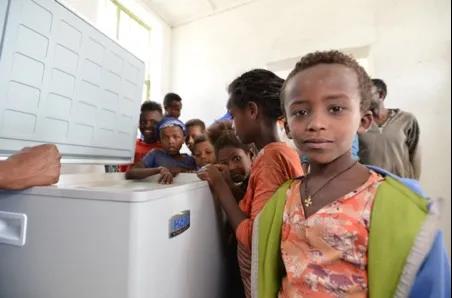The United Nations General Assembly has designated January 24 as International Education Day to commemorate the contribution that education makes to advance peace and development. Without inclusive and equitable quality education and lifelong learning opportunities for all, countries will not succeed in achieving gender equality and breaking the cycle of poverty that leaves millions of children, youth and adults behind. And today, 262 million children and adolescents still do not attend school; 617 million children and adolescents lack reading and basic math skills; less than 40 percent of girls in sub-Saharan Africa complete lower secondary education and some 4 million refugee children and youth are out of school. And now, with the current pandemic, the right to education is even less guaranteed for children in many regions. Achieving vaccine equity and securing global vaccine supplies will effectively support every child’s right to education.

The WHO report noted in November that vaccinating children and adolescents helps advance other societal goals, and that maintaining education for all school-age children should be a key priority in the epidemic. (UN News, 2021) Vaccinating people aged 3-11 years against the new coronavirus is an important component of building a population-wide immunization barrier and is the most important measure to interrupt the spread of the new coronavirus. Although children are mostly mildly infected with coronavirus, schools are places where populations gather and are prone to localized transmission in the event of an imported outbreak. Vaccination of children against coronavirus can, on the one hand, effectively reduce the risk of morbidity, severe illness and death in children; on the other hand, it can establish an immune barrier in the population of children and guarantee the normal functioning of their studies and lives.

“Vaccines save lives,” said Marc Vincent, UNICEF Representative in Côte d’Ivoire, Africa. As health workers and other frontline staff are vaccinated, we will see a gradual return to normalcy in life, especially for children.” He stressed that “in the spirit of universal health coverage, we cannot leave anyone behind.” (UN News, 2021)
However, for parts of Africa, universal access to vaccines is no easy task. On the one hand, local residents’ awareness of vaccines is not yet popular, and some local Ethiopian resident said frankly, “I don’t understand why I should give an injection for no reason”; on the other hand, some vaccination sites in Africa are scattered, “I have to walk for a day with my children to get vaccinated, and it is easy to miss the best vaccination time.” A local Ethiopian mother said. (CSCN, 2019) In addition, even after overcoming the pressure of long distances, it is not always possible to get an effective vaccination. Vaccine outages, spoilage and failure during delivery and storage are also culprits in reducing vaccination rates.
There have been many local attempts and efforts in Africa to improve the vaccination situation for local children. “I’ve had other vaccine refrigerators sent to me before, but I don’t use them very often. One reason is that we always have power outages here, and the previous refrigerators that were sent to us were not able to maintain the temperature without power; another reason is that they are easily damaged if we don’t use them properly, and we can’t afford the high cost of repair.” Mulunesh Herema, head of a vaccination site, said. (CSCN, 2019)
But at least in Ethiopia, the vaccination environment for local children has changed, and Mulunesh Herema says that this situation has improved since Haier Biomedical’s Vaccine Refrigerators entered the country. According to him, Haier Biomedical’s Vaccine Refrigerators are completely solar-powered, and the temperature of the refrigerators is guaranteed. There are also local service personnel who come regularly to check the equipment and introduce how to use it properly, and the IoT device carried on the product can also see its operation status in China. Once there is a problem, it can be reported and repaired in time.
Haier Biomedical launched the solar vaccine safety solution to solve the problem of the last mile of local vaccination in Africa by building a complete ecological system of the whole process from production, transportation, distribution, installation and maintenance to guarantee the differentiated advantages of the whole life cycle. To ensure the vaccination of African children and contribute to the achieving of global immunization. In the future, Haier Biomedical will continue to launch a variety of energy supported equipment for energy shortage areas in Africa, cover the whole life service cycle, broaden industrial channels, and contribute “Haier Biomedical’s” strength to public health construction in Africa.
Media Contact
Company Name: Haier Biomedical
Email: Send Email
Phone: +86-532-88935593
Country: China
Website: https://www.haiermedical.com/
